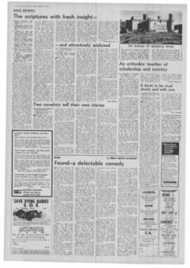Page 1, 28th January 1972
Page 1

Report an error
Noticed an error on this page?If you've noticed an error in this article please click here to report it.
Tags
Share
Related articles
Pope To Be Asked To Ban Bishop Lamont Of Umtali
Archbishop Donal Lamont Of Umtali, Rhodesia, Who Has Been...
'nobody Should Get Over £12,000' Schumacher
A Reign Of Terror
I'll Resist Deportation, Says Lamont
Todd failings 'crazy' says bishop
BY A STAFF REPORTER
BISHOP Donal Lamont, Chairman of the Rhodesian Catholic Bishops' Conference, last week visited Miss Judith Todd who, with her father Mr. Garfield Todd, has been detained by the Rhodesian Government.
Bishop Lamont said that he found Miss Todd in good spirits and well looked after. He had reason, however, to believe that the same could not be said of Mr. Todd. who had been due to attend the Justice for Rhodesia Campaign public meeting held on Tuesday at the Central Hall, Westminster.
Referring to the "abusive"
criticism from White Rhodesians over the pastoral letter of the Rhodesian C'atholic Bishops Conference. condemning the proposed settlement, he said that this was in striking contrast to the general support which the African population had given to it.
Concerning the detentions, Bishop Lamont described them as "crazy." One would expect reasons to be given, but in these cases none had been given.
The Bishop was asked to attend the London meeting to replace Mr. Todd, but had not been able to accept. He sent a statement, however, which was read at the meeting.
A deputation from the Jus tice for Rhodesia Campaign. which included Archbishop Roberts and leaders from other Churches, called on the Foreign Secretary, Sir Alec DouglasHorne, last week. Distressed by the detention of the Todds, Mr. Chinaman° (Treasurer of the African National Council) and others, the deputation was anxious to learn what steps the British Government were tak
ing to secure the release of people arrested without charge, and without evidence that they represented any threat to order and security in Rhodesia.
The deputation stressed that British government policy was based on a fundamental misunderstanding of the aspirations of the African people. It also explained the U n f ortunate consequences
which would follow. from the appeasement of racialism, for Britain's standing in the rest of Africa.
Bishop Christopher Butler of Westminster told a big audience of young people at the Justice for Rhodesia meeting, that he feared even if Africans rejected the settlement, Britain would still resume trade. "I hope the British people make it impossible for the government to take this line of cowardly betrayal."
Mr. Jeremy Thorpe, the Liberal leader, suggested that Lord Goodman or some other qualified negotiator be sent to secure the release of former Rhodesian Premier Garfield Todd. A chair on the platform remained vacant for Mr. Todd, who had agreed to address the meeting before his arrest.
Anglican Bishop Trevor Huddleston of Stepney said the meeting between religious leaders and Sir Alex DouglasHome, had been entirely negative. "He said the agreement was the best that could be obtained in the circumstances and that the Africans would be stupid to refuse it," said the Bishop.
"Rhodesia is an African country and the very idea of negotiations between whites is a gross impertinence and affront to Africans," said Bishop Huddleston.
blog comments powered by Disqus











